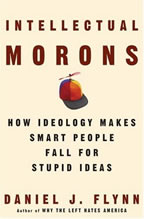
|
| |
|||
| Posted on Mon, Dec. 13, 2004 | |||
|
'Intellectual Morons' a guide flawed by personal invective
Intellectual Morons
Screed is good. And labels are even better. There is nothing more exhilarating than creating a fresh taunt that distills an ideological foe into a puddle of impotent, self-defensive goo. So forget "tax-and-spend liberal" and try out "intellectual moron." But before you do, take this pop quiz to measure your own Intellectual Moron Quotient: What do the following names have in common? Herbert Marcuse, Alfred Kinsey, Noam Chomsky, Paul Ehrlich, Peter Singer, Rigoberta Menchu, Howard Zinn, Leo Strauss, Margaret Sanger, Ayn Rand, Jacques Derrida, Betty Friedan, W.E.B. DuBois, Alger Hiss, and Gore Vidal. Don't worry if you don't know most of these names. You are not an "intellectual moron" according to Daniel J. Flynn, whose new book with that title claims to explain "How Ideology Makes Smart People Fall for Stupid Ideas." The simple rule is that you are an intellectual if you know who they are and why they might be listed together. The moron qualifier is awarded if you tolerate, disseminate, or, God help you, espouse the ideas of anyone listed, either knowingly or unknowingly. Flynn, the author of Why the Left Hates America and a member of the conservative Leadership Institute, revels in his lightning-rod stature as the Non-Moronic Intellectual. For him, Marcuse and the rest are doyens of unsupported theories and downright dangerous ideas. Intellectual morons are those who uncritically adopt these ideas and theories, occasionally fabricating biographies or covering up disturbing behavior of their "intellectual gurus." Flynn's stated goal is a laudatory, indeed galvanizing, call to arms: We all need to know much more of the life, work and beliefs of our cultural movers and shakers. On one level, Flynn proves a very capable guide to these lives and their societal impact. Unfortunately, this tour is accompanied by a sensationalist stew of rehashed controversies, exaggerated claims of influence, and personal invective. The result is a litany of labels, accusations, and dismissals that makes a Michael Moore film seem like nuanced civic discussion. Alfred Kinsey is a "sexual pervert" and "enemy of science." Margaret Sanger is a "serial adulterer... with the sexual morals of a call girl." Jacques Derrida, constantly referred to as "The Frenchman," is a "nonentity in a great number of philosophy programs." Flynn attacks in the name of fighting "stupid ideas" that take root in American culture. Clearly, though, it is the personal lives of those associated with an idea, and all Morons-R-Us who don't bother to dig deeper into these lives, that are the cause of his apoplexy. If we only knew what Flynn knows, and weren't morons, we would also reject ideas that are so obviously wrong and our world would be dramatically different. It is almost as if none of our major societal dilemmas from abortion to AIDS would exist today if people had known in 1953 that Kinsey had serious issues with his own sexuality and that Sanger had three extramarital affairs. Ironically, Flynn has great material to work with that supports his warnings. Kinsey, Sanger, DuBois and many of the others lived lives of disturbing experiences and odd contradictions. He has done solid research, and many of the facts he lists should motivate serious reflection and further investigation. He just doesn't know when to stop, and his purely personal attacks dilute his argument. Is Objectivism really refuted by describing Ayn Rand as singularly unattractive with bushy eyebrows? Flynn would have us become intellectual anti-morons by making the life of an idea's progenitor more important than the idea itself. The danger here arises when one goes too far in this direction, renouncing an idea out of hand because one disapproves of that life. Flynn leaves us with just a different ideology, in which the believer runs the risk of morphing into an anti-intellectual moron. Richard Di Dio teaches mathematics and physics at La Salle University. |
|||
